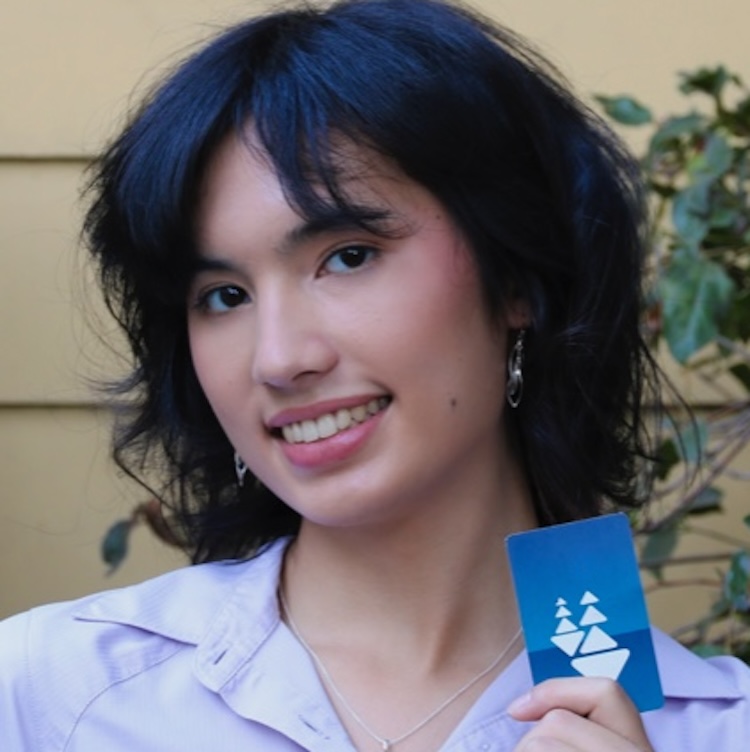- 408-924-7560
- mineta-institute@sjsu.edu
- Donate
Essay Contest

How do we get more people to use public transit? Which policies are best for replacing funding for the declining fuel tax? Are the bike paths in your city distributed fairly for everyone?
The Mineta Transportation Institute Essay Contest invites students in grades 6-12 to propose and explore a solution to a problem centered around a specific theme each year under one or more of the following principles of transportation: sustainability, safety, community, and innovation.
This essay contest is your chance to propose solutions to real-world issues. No matter your passion—sustainability, safety, community, or technology—you can take hold of this moment to write something worth reading about. Don’t forget prize money, a certificate of achievement, and the chance to get published!
Our world is being transformed by technology, by climate change, and by you. Although the future feels uncertain, your voice can make a difference. Are you up for the challenge?
Participants must be enrolled in any public, private, or home school in 6th-12th grade in the United States to participate. Each entry must have a mentor or teacher to review and sponsor the essay. See THE RULES for details on how to submit!
2025-2026 Essay ContestThis year’s competition is hosted by the MTI-led California State University Transportation Consortium, with funding provided through California’s Senate Bill 1, the Road Repair and Accountability Act. |
|||
|
|
|||
|
Download and Print the 2025-2026 Essay Contest Prompt. |
|||
|
In recent years, more tweens and teens are riding electric bicycles (e-bikes), bringing both big benefits and serious safety questions. E-bikes offer kids independence, exercise, and a more sustainable, cheaper alternative to traveling by car. But hospitals are seeing more and more kids injured while riding e-bikes, and there are concerns about reckless riding that put riders, pedestrians, and even motor vehicle drivers at risk. These concerns have led many communities to ask if there should be more limits on how kids ride e-bikes and about whether schools should teach kids safe riding skills. Can you help raise awareness about e-bike safety? Essay Prompts**Each participant can only choose to write about one prompt. Only one entry is allowed per student each year.
|
|||
|
About E-BikesIn the simplest terms, an e-bike is a bicycle that can run on electric power as well as pedaling. E-bikes have all the same parts as a conventional bike, plus a few extra—usually a battery, a motor, and a controller. For some e-bikes, the motor only provides power while the rider is pedaling, but other e-bikes have throttles and can be operated without pedaling, more like a moped.
Are E-Bikes Faster than Conventional Bikes?Some people might say that e-bikes are not any faster than conventional bikes, but there are two main issues with this answer.
Note on E-Bike Speeds: Some e-bikes stop providing electric motor support while pedaling up to 20 mph (Class 1 and Class 2), while others provide power assist up to 28 mph (Class 3). This classification system has been adopted by more than half of U.S. states, including California.
Current Laws & Rules of E-BikesIn July, 2024, Assembly Bill AB 1774 was signed into law in California. The bill prohibits illegal modifications or so-called “hacks” to e-bikes that increase their speed beyond the legal limit and bans the sale of related products to uphold safety regulations. Other states and communities are taking similar actions to reduce the risk of injury. For example, in Marin County, California, many schools mandate the completion of an e-bike safety course if a rider wants to park their e-bike on campus. Age restrictions are also becoming more common, as are restrictions about where e-bikes can be ridden within particular communities.
Notes and Resources
|
The Prizes
A total of $2,250 will be given to four winners! The 1st place winner from the 6th-9th grade category will receive $500, and the 2nd place winner will receive $250. The 1st place winner from the 10th-12th grade category will receive $1,000, and the 2nd place winner will receive $500. Each winner will also receive a certificate of achievement.
Winning essays will be published on MTI’s website and in our newsletter for more than 2,000 readers!
Note: All prizes must be claimed by the end of the academic school year in which the entries were made.
The Rules
All students enrolled in grades 6-12 in public, private, and home schools within the United States are encouraged to submit.
All entries must be original work reviewed, approved, and sponsored by a teacher or mentor. MTI will contact the sponsor with any questions about a specific entry. Homeschooled students must contact a mentor to sponsor their entry. The teacher/mentor must complete and attach the required cover sheet. A digital signature will be approved.
General Rules
-
All essays must be the original work of the student.
-
Essays must be double spaced and can be typed or legibly handwritten.
-
Essays and the required cover sheet must be submitted in PDF format.
-
Any quotations or copyrighted material used in the essay must be identified properly. Failure to identify non-original material will result in disqualification.
-
All participants must cite sources they used to research their topic throughout their essay. Please use parenthetical citations within the text. We can not accept citations in footnote form.
-
Essays must include a bibliography. Accepted formats include APA, MLA, or Turabian.
Grades 6-9 Rules & Essay Details
-
Essays for students in 6th, 7th, 8th, or 9th grade must be between 400 and 500 words. Title, citations, and bibliography are not included in the word count.
-
Essays for students in these grades must use a minimum of two selected sources.
Grades 10-12 Rules & Essay Details
-
Essays for students in 10th, 11th, or 12th grade must be between 700 and 1,000 words. Title, citations, and bibliography are not included in the word count.
-
Essays for students in these grades must use a minimum of five selected sources.
Judging Criteria
Total points possible: 15
-
Content - Understanding of the topic: To what extent did the writer demonstrate a clear understanding of the essay prompt and respond with details about their ideas?
-
Material Organization & Sources - Effectiveness in presenting a point-of-view, logical interpretation of the subject - clear thesis, and supporting ideas, and factual information
- Vocabulary, grammar and spelling - Uses vocabulary related to the transportation industry, use of grammar and spelling
Important Dates |
|
|---|---|
|
February 16, 2026 |
Essay submittal deadline at 11:59PM |
|
March 16-20, 2026 |
Winners announced and prizes coordinated with winning students |
Resources
On Writing
- How to Write a Works Cited or Bibliography from Purdue University Online Writing Lab
- Writing an Argumentative Essay from Purdue University Online Writing Lab
On Transportation
- Transportation News from the United States Department of Transportation
- United States Department of Transportation
- Federal Highway Administration
- Research Publications from MTI
FAQs
Questions about Writing
-
Who is my audience?
Your writing should be appropriate for all audiences and written to inspire your peers and community. The judges include MTI staff, educators, and industry professionals.
-
Can I use AI to help me write?
Although large language models can be a useful tool for brainstorming and even outlining, your essay needs to be your original work. It should not be plagiarized, generated by AI, or written by someone else. All quotations must be cited and sources included in your bibliography.
-
Can I submit more than once?
Each student can only submit to each contest once. You’re welcome to submit again next year!
-
Can my friend/sibling/someone else help me write?
Getting feedback from peers can be very helpful in the writing process, and your work must be reviewed and approved by your mentor/sponsor. Remember, however, that the work itself must be 100% your original work. It should not be plagiarized, generated by AI, or written by someone else. All quotations must be cited and sources included in your bibliography.
-
Can I use ProWritingAid/Grammarly/Spellcheck to check my work?
Your essay must be your original work, but yes, please do use spell check!
-
Can I use an essay I already wrote?
This essay must be written specifically for this contest and not previously published.
Questions about the Rules
-
How will I know if my entry has been received?
You will receive an email response noting that we have received your entry after the submission deadline. Please contact us if submitted before the deadline but you have not heard from us three days after the deadline, or if you have any questions.
-
Who do I contact if I have any questions?
Please reach out to Alverina Weinardy at alverina.weinardy@sjsu.edu with any questions.
Questions about Judging
-
Who are the judges?
Judges include MTI staff, transportation industry professionals, and educators. Judges have extensive industry experience, advanced degrees, teaching experience, etc. that make them uniquely qualified.
-
How do you decide the winners?
Judges use specifically tailored criteria developed by educators and professional writers. The criteria includes content, organization and materials, and grammar and spelling. You can learn more about the criteria in the Rules section under “Judging Criteria.”
Teacher and Mentor Resources
- Essay Writing Handouts from Duke University
- Improving Student Writing from University of Wisconsin
- Transportation Research from MTI
- Online Writing Lab (OWL) from Purdue University
- Guides to Teaching Writing from Harvard
2022-2023 "Rethink Your Ride" Essay Winners |
|||
Group 1 |
Group 2 |
||
 |
Reduction of Car-Reliance in the US EconomyBy Anping Huang
Grade 9, Lynbrook High School, San José, CA
Read Anping's Essay |
 |
Public Transportation: Incentivizing Widespread UsageBy Caitlin Zhou
Grade 10, Lynbrook High School, San José, CA
Read Caitlin's Essay |
2023-2024 #VisionZero2030 Essay Winners |
|||
Group 1 |
Group 2 |
||
 |
Distracted Driving: Its Impact on Society and SolutionsBy Christine Jung
Grade 7, Campbell School of Innovation, Campbell, CA |
 |
Infrastructure That Saves Lives: How to Make El Camino Real Safe For EveryoneBy April Beyersdorf
Grade 12, Saint Francis High School, Mountain View, CA |
2024-2025 "Get Going, Go Green" Essay Winners |
|||
Group 1 |
Group 2 |
||
 |
1st PlaceElectric Vehicles: Their Monumental Impact and How We Can Achieve itBy Neoli Sarkar |
 |
1st PlaceFeasibly Implementing Electric Vehicles: How to Maintain Government Tax RevenueBy Abraham Yeung
Grade 10, American High School, Fremont, CA |
 |
2nd PlaceReplacing the Gas TaxBy Aydin Firoozshahian |
 |
2nd PlaceThe Inaccessibility of Sustainable Transportation in AmericBy Solika Mau
Grade 10, Piedmont Hills High School, San José, CA |
-
Contact Us
San José State University One Washington Square, San Jose, CA 95192 Phone: 408-924-7560 Email: mineta-institute@sjsu.edu








